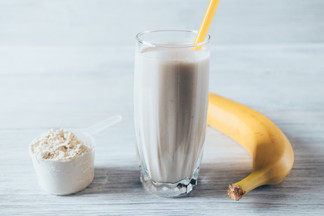Posted by Dee Cee Labs on Jan 13th 2026
The Importance of Post-Workout Nutrition to Complement Chiropractic Adjustments
For athletes and fitness enthusiasts, post-workout recovery is just as important as the workout itself. After intense physical activity, the body requires the right nutrients to repair muscles, restore energy levels, and reduce inflammation. Chiropractic adjustments complement this process by enhancing mobility, correcting misalignments, and reducing post-exercise discomfort.
By integrating proper post-workout nutrition with chiropractic care, individuals can accelerate their recovery, prevent injuries, and optimize their performance. This blog explores how targeted nutrition supports the body’s healing process and how chiropractors can guide patients toward the best post-exercise dietary practices.
Why Post-Workout Nutrition Matters
After a workout, the body undergoes a recovery phase that involves:
- Muscle repair and growth due to microtears sustained during exercise.
- Replenishment of glycogen stores to restore energy levels.
- Reduction of inflammation to prevent excessive soreness and stiffness.
- Rehydration and electrolyte balance to maintain muscle function and prevent cramps.
Without the right nutrients, recovery can be delayed, leading to increased muscle soreness, prolonged fatigue, and a higher risk of injuries. Chiropractic adjustments help enhance circulation, relieve tension, and improve joint function, but without proper nutritional support, the body’s recovery potential is limited.
Key Nutrients for Post-Workout Recovery
1. Protein for Muscle Repair
Exercise, especially strength training and endurance workouts, breaks down muscle fibers. Protein is essential for rebuilding these fibers, leading to stronger, more resilient muscles.
- Best Sources: Lean meats, eggs, dairy, legumes, and protein supplements.
- Timing: Consuming protein within 30-60 minutes post-workout enhances muscle protein synthesis.
2. Amino Acids for Tissue Repair
Branched-chain amino acids (BCAAs) and essential amino acids (EAAs) play a critical role in repairing damaged muscle tissues and preventing soreness.
- BCAAs (Leucine, Isoleucine, Valine): Reduce muscle breakdown and accelerate recovery.
- EAAs: Support overall muscle health and immune function.
Recommended: Amino PRO – Provides essential amino acids for muscle recovery and reduced soreness.
3. Carbohydrates to Restore Energy
After a workout, glycogen levels are depleted, leading to fatigue. Carbohydrates help replenish these stores and provide energy for the next training session.
- Best Sources: Whole grains, fruits, starchy vegetables, and oats.
- Timing: Pairing carbs with protein post-exercise improves muscle glycogen synthesis.
4. Omega-3s to Reduce Inflammation
High-impact workouts can lead to joint stress and inflammation. Omega-3 fatty acids help reduce muscle stiffness and support joint mobility, making them a crucial part of post-workout recovery.
Recommended: Superior Omega-3 with DPA – Supports inflammation reduction and joint health.
5. Magnesium for Muscle Relaxation
After exercise, muscles need to relax to prevent spasms, cramping, and excessive tension. Magnesium plays a key role in muscle contraction and relaxation, making it essential for post-workout recovery and chiropractic adjustments.
Recommended: Magnesium Super Potency – Helps prevent muscle cramps and promotes relaxation.
6. Vitamin D + K2 for Bone and Joint Health
Weight-bearing exercises and high-impact activities can strain bones and joints. Vitamin D enhances calcium absorption, while Vitamin K2 directs calcium to bones instead of soft tissues, preventing joint calcification.
Recommended: Vitamins D3 + K2 – Supports strong bones and healthy joint function.
7. Hydration and Electrolytes for Muscle Function
Sweating depletes electrolytes like sodium, potassium, and magnesium, which are crucial for nerve signaling and muscle contraction. Proper rehydration prevents muscle cramps, dizziness, and fatigue.
- Best Sources: Electrolyte drinks, coconut water, and mineral-rich foods.
Recommended: Magnesium and Potassium Aspartate – Restores electrolytes for optimal muscle function.
How Chiropractic Adjustments Enhance Post-Workout Recovery
Chiropractic care helps restore balance to the body after intense exercise, promoting faster recovery and injury prevention. Here’s how adjustments support post-workout healing:
- Corrects Postural Imbalances: Reduces strain on muscles and joints caused by poor form during workouts.
- Relieves Muscle Tension: Eases tightness and knots that develop from repetitive movements.
- Enhances Circulation: Improves blood flow to tissues, aiding in faster nutrient delivery and healing.
- Supports Joint Mobility: Ensures proper range of motion, preventing stiffness and injuries.
Combining chiropractic care with strategic post-workout nutrition helps patients recover faster, reduce pain, and improve athletic performance.
Final Thoughts
For athletes and fitness enthusiasts, optimizing recovery is key to staying injury-free and maintaining peak performance. Chiropractic adjustments realign the body, while proper post-workout nutrition fuels tissue repair, reduces inflammation, and restores energy levels.
By guiding patients toward nutrient-dense foods and high-quality supplements, chiropractors can help them maximize the benefits of their adjustments and maintain long-term musculoskeletal health.

